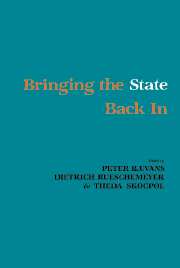Book contents
- Frontmatter
- Contents
- Preface
- Introduction
- Part I States as Promoters of Economic Development and Social Redistribution
- Part II States and Transnational Relations
- Part III States and the Patterning of Social Conflicts
- 8 Working-Class Formation and the State: Nineteenth-Century England in American Perspective
- 9 Hegemony and Religious Conflict: British Imperial Control and Political Cleavages in Yorubaland
- 10 State Power and the Strength of Civil Society in the Southern Cone of Latin America
- Conclusion
- Notes on the Contributors
- Index
8 - Working-Class Formation and the State: Nineteenth-Century England in American Perspective
Published online by Cambridge University Press: 29 January 2010
- Frontmatter
- Contents
- Preface
- Introduction
- Part I States as Promoters of Economic Development and Social Redistribution
- Part II States and Transnational Relations
- Part III States and the Patterning of Social Conflicts
- 8 Working-Class Formation and the State: Nineteenth-Century England in American Perspective
- 9 Hegemony and Religious Conflict: British Imperial Control and Political Cleavages in Yorubaland
- 10 State Power and the Strength of Civil Society in the Southern Cone of Latin America
- Conclusion
- Notes on the Contributors
- Index
Summary
When the House of Representatives investigated election fraud in New York City in 1868, it uncovered a massive scheme organized by Tammany Hall to sell counterfeit naturalization papers in order to register immigrants, who were not yet citizens, to vote. The committee report revealed that neighborhood saloons provided the locations for most of this activity. The testimony of Theodore Allen, the owner of “St. Bernard's” on Thompson Street in Greenwich Village, was quite typical:
I keep a public house, and a man by the name of James Goff and his brother, who were engaged in procuring naturalization certificates, used to come to my house a great deal. … I suppose 1000 were sent to Brooklyn that I saw them have. They contracted for these papers, they said, at 50 cents a head.
Each Sunday evening, from the mid-1850s to the late 1880s, a debating society met at the Hope and Anchor Inn on Navigation Street in England's Birmingham. Some twenty to forty speakers would argue their cases on a set topic. From the vantage point of the middle classes, Brian Harrison has noted,
there was much to frighten the outside observer: the motion of 23 January 1859 for working class enfranchisement was unopposed, and the monarchy lost by thirtynine votes to sixteen in a debate on republicanism on 22 March 1863. On two occasions, 26 August 1866 and 21 April 1867, the Society was visited by prominent London Reform Leaguers: these included George Howell who joined in the debates. … […]
- Type
- Chapter
- Information
- Bringing the State Back In , pp. 257 - 284Publisher: Cambridge University PressPrint publication year: 1985
- 19
- Cited by



